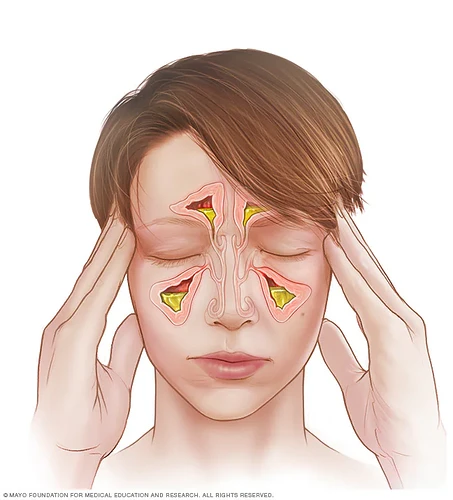From an Ayurvedic perspective, seasonal allergies are seen as a manifestation of dosha imbalance, most often linked to an excess of Kapha dosha.
This imbalance typically affects the upper respiratory tract, leading to symptoms like congestion, sneezing, and sinusitis.
The Ayurvedic approach doesn’t merely target symptoms but focuses on restoring balance through:
• Lifestyle modifications
• Dietary adjustments
• Herbal and natural interventions
Sinusitis is an infection or inflammation of the paranasal sinuses and nasal passages. Obstruction and swelling lead to mucus accumulation, creating a favorable environment for pathogen growth.
Ayurvedic Interventions for Sinusitis
1. Triphala
- A renowned herbal formulation with strong antioxidant and anti-inflammatory properties.
- Helps reduce mucosal inflammation and supports sinus drainage.
- Modern studies validate its role in lowering oxidative stress and easing respiratory inflammation.
- Nasal Irrigation (Nasya & Jal Neti)
- Using Ayurvedic herbal solutions or saline-based washes.
- Proven to reduce congestion, improve sinus aeration, and lower infection risk.
- Especially beneficial for children, who often face recurrent sinonasal issues.
- Cost-effective, simple, and preventive.
- Lifestyle & Diet
- Avoid heavy, cold, and mucus-forming foods (like dairy, fried foods, and excess sweets).
- Favor warm, light, easily digestible meals with spices such as ginger, turmeric, and black pepper.
- Practice steam inhalation with Ayurvedic herbs (tulsi, ajwain, eucalyptus) for relief.
Conclusion:
Ayurveda’s clinical approach to allergies and sinusitis integrates time-tested herbal remedies with modern scientific validation.
By targeting the root cause (dosha imbalance) rather than only managing symptoms, Ayurveda offers a holistic, preventive, and therapeutic path for long-term relief Cost-effective, simple, and preventive.
MBH/AB
